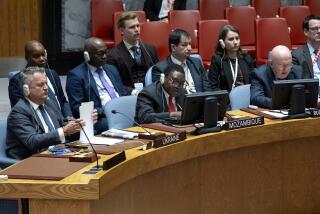Cuba Can Be Nudged, Not Bullied, on Rights
- Share via
When the U.N. Commission on Human Rights met in Geneva two months ago to discuss the situation in Cuba, human rights took a back seat to ideological warfare.
A U.S. initiative to draw attention to the human-rights practices of Fidel Castro’s government sparked an emotional battle that ended in a promising compromise: The Cuban government invited a delegation from the commission to conduct an investigation in Cuba and to report back next year.
Rather than celebrating this progress, the United States seemed more interested in attributing a diplomatic loss to the Cubans. If the Reagan Administration continues this cold-war jockeying, the only sure loss will be of an exceptional opportunity to correct serious human-rights violations in Cuba.
After its first effort to condemn Cuba’s human-rights practices failed by a single vote in 1987, the Administration returned to Geneva this year determined to prevail. It appointed a former Cuban prisoner, Armando Valladares, to head the U.S. delegation, and sent emissaries to key Latin American countries to pressure them to support the U.S. resolution. In Geneva, Valladares replayed this theme, threatening that the United States would consider a negative vote to be a hostile act. He illustrated his point by asserting that India had been docked $15 million in economic aid for opposing the earlier U.S. initiative.
In a campaign that spared no sacrifice, the Reagan Administration was also willing to sacrifice the truth. A trip that we made to Cuba in February, together with other information reaching Human Rights Watch, demonstrated that an appropriate initiative at Geneva could have drawn attention to serious violations that indeed exist. After touring prisons and meeting at length with independent human-rights monitors, political prisoners and high-level government officials, we concluded that the Cuban government must institute substantial reforms if its professed respect for human rights is to be credible.
There have been some positive changes in the past year: The Cuban government has released a number of political prisoners, and for the first time has permitted two unofficial human-rights groups to operate, although they have been subject to occasional harassment. Yet Cuba remains a closed, highly controlled society in which political opposition to the government can result in the loss of one’s job, the denial of education opportunities and imprisonment. Criminal defendants must depend on government-employed lawyers who often make little effort to present a defense. Trials are conducted before judges who are not independent. Convicted defendants face long prison sentences with infrequent family visits and correspondence. And prisoners who resist “reeducation” may be punished with inhumane confinement in dark and cramped cells.
Not content with cataloguing these real abuses, the Reagan Administration added numerous overstated allegations to its campaign. The State Department’s Country Report on Human Rights Practices for 1987, which served as a briefing book for the effort in Geneva, spoke of ongoing “secret executions,” “systematic torture” and “disappearances.” While in the past the Castro regime has been responsible for secretly executing thousands of “counterrevolutionaries” and severely mistreating countless others, we found no evidence that these practices persist today.
Predictably, the Cuban government has responded only to the exaggerated claims and the related ideological campaign, ignoring the troubling human-rights practices that the United States could have stressed but did not. At the beginning of the Geneva session, in an unprecedented step, the Cuban Communist Party newspaper Granma printed a point-by-point retort to a similar set of charges issued by an unofficial Cuban human-rights group. The State Department’s report had relied extensively on those charges, though not always accurately. The Cuban government’s rebuttal allowed it to appear open to discussing human rights while avoiding the difficult issues of its intolerance of dissent, lack of due process and confinement of prisoners under grossly substandard conditions.
We expect that the U.N. Commission’s delegation will confront a similar sideshow in its inspection of Cuba this summer unless it focuses on the real, not the imagined, violations that endure. If the Reagan Administration continues the cold-war rhetoric and exaggeration of its Geneva campaign, it will only facilitate Cuban efforts to avoid the human-rights issues that merit discussion. To engender a sober and meaningful examination of human rights in Cuba, the United States must substitute accuracy for ideology as the guiding principle of its human-rights campaign.
More to Read
Sign up for Essential California
The most important California stories and recommendations in your inbox every morning.
You may occasionally receive promotional content from the Los Angeles Times.












